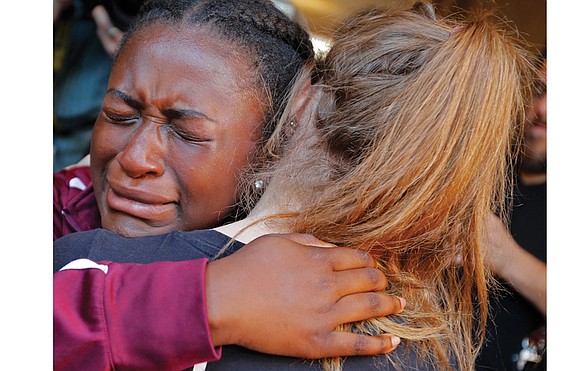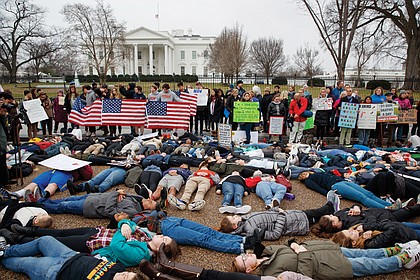Fla. school shooting survivors hoping to be catalyst for tougher gun laws
Free Press wire reports | 2/22/2018, 7:18 p.m.

PARKLAND, Fla.
Bodies of the dead were still inside Marjory Stoneman Douglas High School in Parkland, Fla., when the teenage survivors of the Valentine’s Day massacre began speaking out about gun violence.
The shell-shocked mostly white suburban teens stepped straight from the bullet-scarred school into the nation’s gun debate.
Rather than retreating into their private lives, the young people who saw classmates slain quickly became advocates for stronger weapons laws — drawing verbal fire from conservatives pushing to end restrictions on carrying concealed weapons.
Joined by young people in other cities, such as Washington, D.C., where supporters staged a lie-in in front of the White House, the Parkland survivors are planning marches and more demonstrations in Florida and elsewhere to highlight the need for greater gun control.
David Hogg, a senior and news director at the high school, recorded video of the Feb. 14 killing spree by a former student that left 17 dead and others wounded as he huddled in a room with fellow students.
“Imagine hearing bullets; it’s absolutely awful,” David said. “This is why people need to be politically active. This needs to be a turning point.”
But will the new teen activism on gun control fade as has happened after previous massacres at Virginia Tech, Sandy Hook and a host of other places, such as the more recent shootings at the Pulse nightclub in Orlando or at the country music concert in Las Vegas?
The Parkland students say no. They say they want their generation to be the catalyst for change.
So far, the teens have sparred with gun rights activists on social media, given many television interviews and spoken at vigils that doubled as rallies for safer gun laws.
However, the jury is still out on whether this school shooting, or any of the other 17 that have occurred just since Jan. 1, will make a difference to lawmakers and government executives who are beholden to gun rights groups like the National Rifle Association.
President Trump offered condolences, but went to play golf at his Mar-a-Lago resort over the weekend rather than attend a funeral for one of the dead students. On Wednesday, he met at the White House with several of the Florida students and parents who had lost children.
As their meeting occurred, students participated in protests and walkouts outside the White House and at schools across the country. The outpouring of outrage over the shooting appeared to have forced the president to announce some action.
In the wake of the shooting, President Trump announced Tuesday that he would ask the Justice Department to write regulations banning “bump stocks” that turn a semi-automatic rifle into a fully automatic weapon.
However, the Parkland students remain unimpressed. For them, such a change would have made no difference. The shooter, former Douglas High student Nikolas Cruz, 19, used a military-style AR-15 rifle that didn’t have a bump stock. However, one was used by the shooter in the October massacre in Las Vegas.
Doubts also are being raised as to whether the President Trump was actually taking a meaningful step, though tiny. Legal experts are questioning whether the Justice Department currently has the authority to write such a regulation if Congress does not pass legislation to implement such a ban. Moreover, the regulatory process, including public comment periods, is slow, meaning it could take months, if not years, to put such a regulation on the books.
President Trump also tweeted support for stronger background checks, even though during his first year in office, he weakened the national background check system and recently introduced a budget plan that calls for slashing financial support for that system by 15 percent.
Moreover, he worked with the Republican-dominated Congress just a year ago to eliminate new regulations spearheaded by former President Obama to make it harder for mentally ill people to buy guns.
Meanwhile, bills to strengthen gun control or improve the background check system remain bottled up in congressional committees.
The biggest impact from the shooting could be felt in the Sunshine State, a paradise for gun-rights advocates.
State Sen. Bill Galvano, a Republican and the incoming Florida senate president, said the state Senate was preparing a package that would propose to raise the age to purchase any firearm to 21, create a waiting period for purchasing any type of firearm, ban bump stocks and create gun-violence restraining orders that could prevent people like the Parkland high school shooter from purchasing weapons.
The Florida Senate also is considering giving law enforcement greater power to involuntarily hold someone considered a danger to themselves, Sen. Galvano said, and deputizing a teacher or someone else in schools so they are authorized to have a gun.
“We need to make sure everything is working and to learn from the experience,” said Sen. Galvano after visiting the high school.
But it may be a tough sell. One of Sen. Glavano’s colleagues, Sen. Dennis Baxley, said he’s skeptical about the package. “Sometimes I wish gun-control advocates were right, that this would fix it, but it won’t. We have a terrible problem with obesity, but we’re not banning forks and spoons.”
Student activists hope they can do what adults have been unable to — pass meaningful legislation.
At a vigil for the victims, a crowd of more than 1,000 people, consisting largely of students, chanted, “No more guns! No more guns!”
An anti-Trump women’s group is urging gun control advocates supporters to stage a 17-minute walkout from schools across the country on Wednesday, March 14, to show solidarity with the Parkland students and “to protest Congress’ inaction to do more than tweet thoughts and prayers in response to the gun violence plaguing our schools and neighborhoods.”
Students from Parkland, meanwhile, are organizing a march on Saturday, March 24, in Washington called the “March for Our Lives” to call for change.







